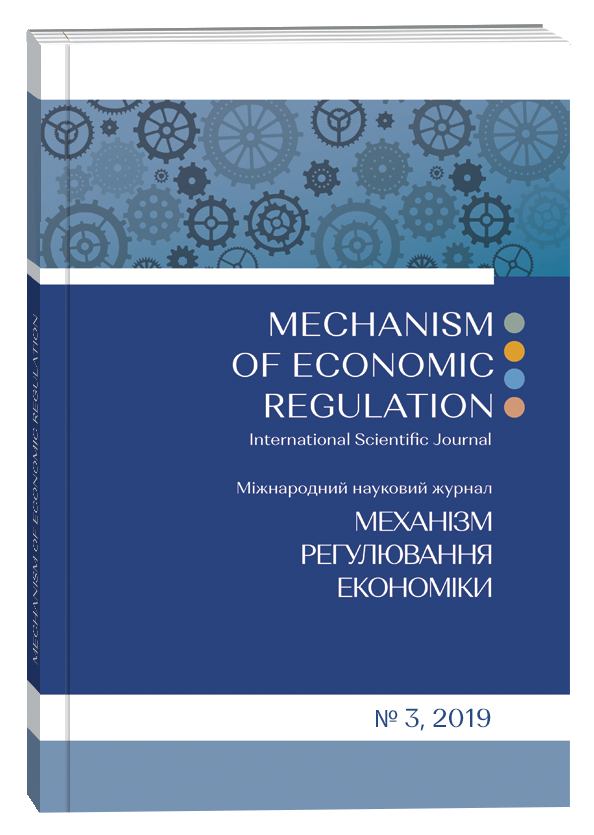SUSTAINABLE DEVELOPMENT OF BASIC TERRITORIAL SELF-SUFFICIENT ENTITIES OF UKRAINE AND POLAND
Abstract
The paper aimed on the basis of analysis of Basic territorial self-sufficient entities (BSTEE) in Ukraine and Poland and their budget constraints to confirm the hypothesis about mismatch between the needs and opportunities for attracting budget funds (on the example of the environmental tax in Ukraine and decreasing of the environmental tax rate in Ukraine over the last 5 years) and systemizing the opportunities experience in this field of communes in Poland. It has been proved that increasing the efficiency of collecting and using financial resources for rising effectiveness of territorial development on a basic level are: simplifying tax administration; providing institutional capacity and permits for its accumulation, storage in banking institutions, for the purpose of pooling environmental tax funds with other communities to form joint financial associations; clarification of the articles that can be spent on environmental tax, the inclusion of these articles in the direction of expenditure aimed at integrated design of sustainable development territories. The authors focused on the hypothesis that for the basic territorial entities the efforts should be concentrated on the identifying the perspective economic vectors of development and forming the bases for implementation all previous formulated issues within the framework of designing, programming and policy making. It is emphasized that the perspective direction of BSTEE development may not coincide with the traditional economy, but rely on the available and perspective natural, human and infrastructural resources. It is proved that the economic profile of BSTEE should include variability of development taking into account the tendencies of nature management, demand and perspective of certain types of resources. The article concluded that it is substantiated that for the BSTEE at the time of determining the perspective economic orientation of development as a sphere of application of efforts within the framework of designing, programming and policy making. This allows the industry that forms the economic “profile” of BSTEE to become the basis. That is, one that has prospects for development for 10–15 years.
References
Badera, Jarosław, Pazderski, Leszek (2017). Effects of lignite surface mining on local communities: controversies and areas of negotiation. Sciendo – Environmental & Socio-economic Studies, 5(3), 31–39.
Bairak, S. (2013). Mistseve samovriaduvannia Respubliky Polshcha: osoblyvosti stanovlennia ta zasady funktsionuvannia. Studia politologica Ucraino-Polona, 3, 255–262. Retrieved from http://nbuv.gov.ua/UJRN/Spup_2013_3_30.
Chumbula, Jimson Joseph, Massawe, Fatihiya Ally (2018). The role of local institutions in the creation of an enabling environment for water project sustainability in Iringa District, Tanzania. Sciendo Environmental & Socio-economic Studies, 6(4), 1–10.
Danko, Y. (2017). Competitive principles of sustainable rural development. Regional Economics, 3, 70–76.
Interactive Map (2019). Europe's Most Popular Startups. Retrieved from https://www.paymentsense.com
Kocoń, Paweł (2015). Selected social phenomena following the extraction of mineral resources. Sciendo Environmental & Socio-economic Studies, 2(4), 47–51.
Letter of the State Tax Service of Ukraine dated 16.01.2019 № 1422/7 / 99-99-12-03-04-17 “On the administration of the environmental tax”. Retrieved from http://sfs.gov.ua/zakonodavstvo/podatkove- zakonodavstvo/listi-dps/print-73141.html.
Local Budget (2019). Revenues and Expenditures: Briefly on the Main – Cost of State. Retrieved from http://cost.ua/news/687-revenues-and-expenditures-of-local-budgets.
Szymańska, Wioletta, Michalski, Tomasz (2019). Population changes in former voivodeship cities in Poland in the context of suburbanization processes and loss of the administrative function. Sciendo Environmental & Socio-economic Studies, 7(3), 66–78.
Ovsiak Katazhyna (2012). Mistsevi podatky yak dzherelo dokhodiv mistsevykh biudzhetiv Polshchi v umovakh finansovoi kryzy. Ekonomichnyi analiz 10(2), 312–315.


